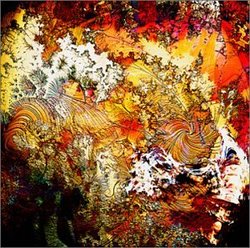| All Artists: Djam Karet Title: New Dark Age Members Wishing: 2 Total Copies: 0 Label: Cuneiform Original Release Date: 1/1/2001 Re-Release Date: 5/22/2001 Genres: Pop, Rock Styles: Progressive, Progressive Rock Number of Discs: 1 SwapaCD Credits: 1 UPC: 045775014920 |
Search - Djam Karet :: New Dark Age
 | Djam Karet New Dark Age Genres: Pop, Rock
|
Larger Image |
CD Details |
CD ReviewsNew Dark Age? I Don't Think So... P. A. Agnew | Wellington New Zealand | 08/18/2001 (4 out of 5 stars) "If your idea of modern progressive rock are bands like the Flower Kings, Spock's Beard and Transatlantic, then you are certainly in for a shock. For unlike those three bands who simply recycle the exhausted classic Yes/Genesis sound, Djam Karet remain one of the very few modern prog rock groups who, as one Amazon reviewer commented, are looking forwards rather than backwards. Although Djam Karet has its roots in mid 70's Pink Floyd and King Crimson, the band have fearlessly pursued their own musical identity for the last 15 years, and have developed a sound which encompasses (amongst other things) digital keyboards and sound sampling, ethnic influences and exotic percussion. Sadly, while Djam Karet quietly innovate, the bulk of the progressive rock audience are still making do with the likes of the three bands mentioned above.Djam Karet's catalogue can be roughly divided into two parts. On the one hand, the band has released moody atmospheric "ambient" music (Suspension and Displacement) on the other, the band has also produced blistering, jagged guitar based rock (Burning the Hard City; The Devouring). With "New Dark Age" Djam Karet finally succeed in moulding their two musical worlds together. The short tracks on this release, such as "Eclipse of Faith" and "Demon Train" take the soundscapes of "Suspension" and "Collaborator" one step further. The band deftly combine filtered voices, field recordings and synths into a compelling and disturbing whole. But it is on the longer tracks that the band truly comes into its own. "All Clear" is a classic rock jam with some brilliant bass (bassist Henry Osborne is in particularly fine form on this album); "Raising Orpheus" combines acoustic and electric guitars, cellos and quiet synths resulting in a track that sounds almost light years ahead of most other bands within the genre. The same applies for "Alone With the River Man" in which Djam Karet once again demonstrates its ability to sculpt innovative musical textures while a new maturity is evident in tracks such as "Going Home" and the excellent opener "No Man's Land." The album is so seamlessly put together and so well produced that you don't even notice the lack of vocals. As one reviewer noted below, this is almost an instrumental concept album.Perhaps the only thing that works against this album is the writing on some of the longer tracks. On "River Man" and "Going Home" for instance, the band move from one idea to the next without really developing an earlier theme, but as Djam Karet's musical ideas are so fascinating, that hardly detracts from the music.Taken as a whole, this album shows that Djam Karet remain at the forefront of a small group of modern prog bands who aren't afraid to innovate and utilise modern musical trends. If you are getting tired of the Flower Kings and their ilk recycling the same old ideas on successive albums, then it's time to tune to Djam Karet, for they are definitely lighting new paths for prog rock. A New Dark Age? No, I don't think so." Djam it all to Hell! Jeff Patterson | Bristol, CT USA | 06/18/2001 (5 out of 5 stars) ""New Dark Age" is a perfect title for this compelling work. the CD combines the roiling drama of their "dark" stuff with bits of the more ethereal material threaded through. A really thrilling album. "No Man's Land" just plain rocks, "Raising Orpheus" is one of their best compositions ever, and "Alone with the River Man" is a truly sprawling work of complexity and beauty. This CD seems to have more of a theme than previous releases, all the material flows well. Almost an instrumental concept album (if such a thing is possible). This is the soundtrack to a thinking man's apocalypse." Instrumental, atmospheric progressive rock at its finest Carol J Hedden | 06/27/2001 (4 out of 5 stars) "this album takes alot of listens to fully achieve its greatest potential, for it is more sophisticated than their other albums, which are far more sophisticated than the average prog rock band. This is music with lots of depth. Sounds fairly "jam" oriented, but also extremely organized, and stressfully planned out. Djam Karet seems to be the only band that ive heard that pulls this off. This is what makes them unique. They are masters at presenting a "groove"-like sound, yet, at the same time, bringing a Floydish, atmospheric mood to the listener. Every time i listen to it, i discover more about what this mysterious band is about. Reccomended to anyone who likes progressive rock, but is searching for new, undiscovered dimensions of it."
|

 Track Listings (10) - Disc #1
Track Listings (10) - Disc #1